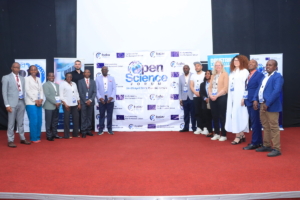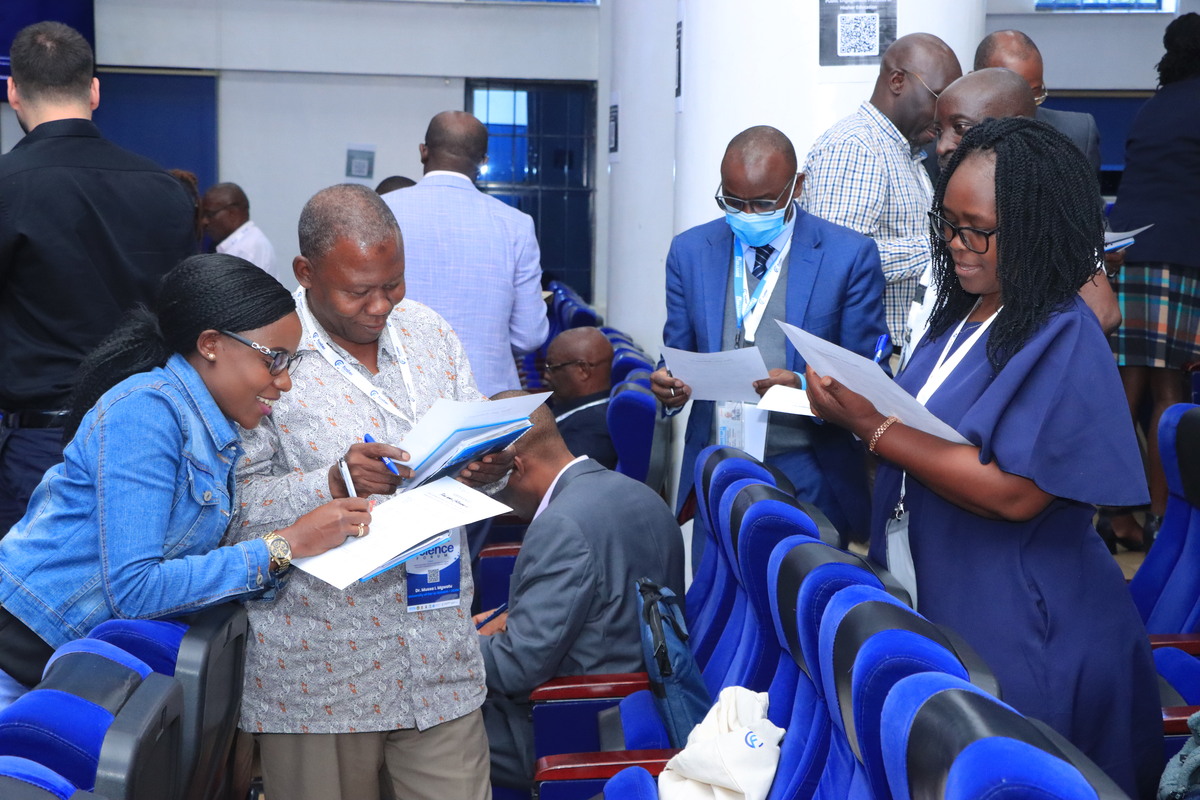FOSTER Project Open Science Forum, Edition 1
By Grace Mbogo
At the inaugural Open Science Forum held on 24–25 April 2025 in Nairobi, legislative partners, higher education stakeholders, leaders in research, policy influencers, and open science pioneers convened under the FOSTER Project to champion a transformative vision: a contextually grounded Open Science ecosystem for Sub-Saharan Africa. Hosted at Daystar University, the forum was a landmark convergence of minds from Kenya, Tanzania, and partner institutions across Europe, with a shared mission to redefine knowledge sharing and scholarly equity on the continent.
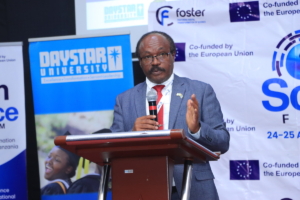 Opening the two-day conference, Prof. Mike Kuria, CEO of the Commission for University Education, set the tone with a powerful declaration: “Open Science is key to African independence and social transformation.” His words rang with urgency—Africa must transition from passive consumer to active producer of knowledge. He emphasized the moral imperative of sharing knowledge as a human act and the practical benefits of equity in global research ecosystems.
Opening the two-day conference, Prof. Mike Kuria, CEO of the Commission for University Education, set the tone with a powerful declaration: “Open Science is key to African independence and social transformation.” His words rang with urgency—Africa must transition from passive consumer to active producer of knowledge. He emphasized the moral imperative of sharing knowledge as a human act and the practical benefits of equity in global research ecosystems.
The Project Coordinator Grace Mbogo, delivered the context-setting presentation at the Open Science Forum, highlighting the collaborative vision of the FOSTER Project which brings together nine partners from five countries to foster digital transformation, promote Open Access, and embed Open Science practices within universities in Kenya and Tanzania. Her address positioned Daystar University as a key driver of the regional efforts toward inclusive and sustainable research ecosystems.
Through spirited panels, high-level presentations, and deep reflections, participants explored how Kenya and Tanzania are moving toward embedding Open Science in national and institutional frameworks. Dr. Olesea Sîrbu of EPDRI traced the global and regional evolution of Open Science.
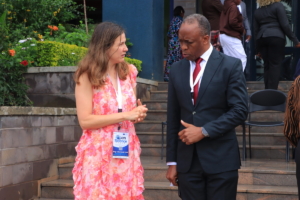 Global partners showcased diverse models of Open Science implementation, offering valuable lessons for the African context. Dr. Olesea Sîrbu of
Global partners showcased diverse models of Open Science implementation, offering valuable lessons for the African context. Dr. Olesea Sîrbu of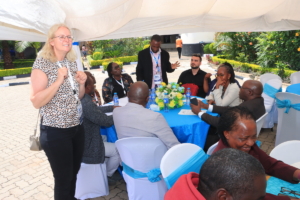 the European Policy Development and Research Institute (EPDRI), Slovenia also the project co-coordinator, set the stage with an overview of the FOSTER initiative and the progression of Open Science across Eastern Europe, Asia, and Africa. Invited speaker Dr. Shaliza Ibrahim from the University of Malaysia shared Malaysia’s journey through the Open Asia Project, highlighting national coordination through the Malaysia Open Science Platform (MOSP), institutional alignment, and the importance of sustainability planning. Dr. Audrey Masizana from Botswana presented findings from the OSCAR 2.0 Project, detailing progress in national Open Data policies, readiness assessments, and the legal and infrastructural challenges in Southern Africa. From Spain, Prof. Dr. Rafael de Miguel González of the University of Zaragoza shared insights into national and regional OS strategies, including the work of the Ibercivis Foundation in promoting citizen science. Dr. Nada Širca and Dr. Aleš Trunk of ISSBS, Slovenia, showcased Slovenia’s national repositories, Open Access infrastructure, and platforms for public engagement like CitizensScience.si. Prof. Marjolein Zweekhorst of Vrije Universiteit Amsterdam emphasized the Dutch model’s integration of interdisciplinary research, policy frameworks, and community-based learning. These diverse practices underscored a shared global commitment: that effective Open Science depends not only on access but on alignment—between institutions, governments, and the public.
the European Policy Development and Research Institute (EPDRI), Slovenia also the project co-coordinator, set the stage with an overview of the FOSTER initiative and the progression of Open Science across Eastern Europe, Asia, and Africa. Invited speaker Dr. Shaliza Ibrahim from the University of Malaysia shared Malaysia’s journey through the Open Asia Project, highlighting national coordination through the Malaysia Open Science Platform (MOSP), institutional alignment, and the importance of sustainability planning. Dr. Audrey Masizana from Botswana presented findings from the OSCAR 2.0 Project, detailing progress in national Open Data policies, readiness assessments, and the legal and infrastructural challenges in Southern Africa. From Spain, Prof. Dr. Rafael de Miguel González of the University of Zaragoza shared insights into national and regional OS strategies, including the work of the Ibercivis Foundation in promoting citizen science. Dr. Nada Širca and Dr. Aleš Trunk of ISSBS, Slovenia, showcased Slovenia’s national repositories, Open Access infrastructure, and platforms for public engagement like CitizensScience.si. Prof. Marjolein Zweekhorst of Vrije Universiteit Amsterdam emphasized the Dutch model’s integration of interdisciplinary research, policy frameworks, and community-based learning. These diverse practices underscored a shared global commitment: that effective Open Science depends not only on access but on alignment—between institutions, governments, and the public.
Voices from FOSTER partner institutions in Kenya and Tanzania offered a grounded view of the region’s progress, challenges, and ambitions in Open Science. Moderated by Dr. David Kalaba, the session featured insightful contributions from university librarians, research coordinators, and project leads. Ms. Jane Yobera, University Librarian at Daystar University, highlighted existing frameworks such as institutional repositories and internal research funding, while noting a persistent gap in awareness and policy integration. From Garissa University, Dr. Iddi Juma outlined both optimism and hesitation—where foundational structures are emerging, but cultural resistance and limited funding still hinder full adoption. Paul Ruto of St. Paul’s University shared how infrastructure limitations are being counterbalanced by growing efforts in collaborative research and policy development. In Tanzania, Dr. Mussa Mgwatu, FOSTER Project Coordinator at the University of Dar es Salaam, detailed the university’s multi-pillar Open Science strategy, including journal publishing infrastructure and regional collaborations. Dr. Lucky Yona of ESAMI reinforced the importance of institutional commitment and stakeholder partnerships. Collectively, their reflections affirmed that while Open Science is gaining momentum in the region, sustainable implementation hinges on deliberate investment, policy integration, and robust capacity building.
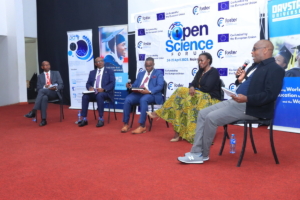 A key highlight was the panel session titled “Strengthening the Open Science Ecosystem,” moderated by Dr. Kevin Murithi of St. Paul’s University. Here, institutional voices unpacked both the philosophical and infrastructural shifts needed to embed Open Science across African higher education. Joy Owango, Founding Director of the Training Centre in Communication, framed Open Science as a platform for social justice and African research sovereignty. Prof. Abraham Waithima of St. Paul’s University emphasized the importance of liberalizing data access through university policies, while Mr. Cyrus Kamau of the Teachers Service Commission highlighted the strategic integration of global research tools like ORCiD. Dr. Henry Waruhui of ESAMI called for a rethinking of education systems to support democratized and data-driven science.
A key highlight was the panel session titled “Strengthening the Open Science Ecosystem,” moderated by Dr. Kevin Murithi of St. Paul’s University. Here, institutional voices unpacked both the philosophical and infrastructural shifts needed to embed Open Science across African higher education. Joy Owango, Founding Director of the Training Centre in Communication, framed Open Science as a platform for social justice and African research sovereignty. Prof. Abraham Waithima of St. Paul’s University emphasized the importance of liberalizing data access through university policies, while Mr. Cyrus Kamau of the Teachers Service Commission highlighted the strategic integration of global research tools like ORCiD. Dr. Henry Waruhui of ESAMI called for a rethinking of education systems to support democratized and data-driven science.
Equally critical was the session on “Open Science Early Adopters in the Region,” moderated by Dr. Martin Munyao. It featured practitioners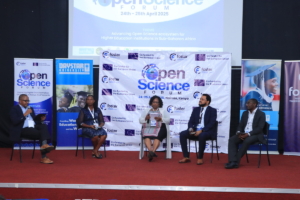 already leading Open Science implementation at the institutional level. Mr. Kennedy Aseda of KENET presented Kenya’s strides in digital research infrastructure. Dr. Penninah Musangi of AMREF International University shared models for collaboration and capacity-building. Dr. Arnold Mwanzu of KLISC addressed the structural barriers to equitable publishing, and Prof. Peter Gatiti of the Kenya Library Association championed virtual libraries and national bibliographic access.
already leading Open Science implementation at the institutional level. Mr. Kennedy Aseda of KENET presented Kenya’s strides in digital research infrastructure. Dr. Penninah Musangi of AMREF International University shared models for collaboration and capacity-building. Dr. Arnold Mwanzu of KLISC addressed the structural barriers to equitable publishing, and Prof. Peter Gatiti of the Kenya Library Association championed virtual libraries and national bibliographic access.
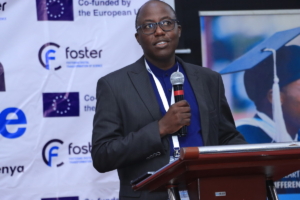 As the forum concluded, Prof. Muturi Wachira urged attendees to carry the torch: “Let this be more than a meeting—let it spark a movement.” With the FORSTER Project anchoring regional efforts, the vision is clear: Africa can lead in Open Science, not just follow.
As the forum concluded, Prof. Muturi Wachira urged attendees to carry the torch: “Let this be more than a meeting—let it spark a movement.” With the FORSTER Project anchoring regional efforts, the vision is clear: Africa can lead in Open Science, not just follow.
Together, these sessions underscored a growing consensus: Open Science must be locally defined, adequately resourced, and integrated into institutional and national policy frameworks. With the FOSTER Project facilitating regional alignment, the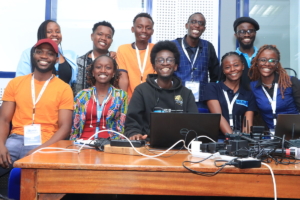 Forum became more than a knowledge-sharing event—it was a catalyst for coordinated action. As African institutions step forward to shape global research norms, the momentum built at this first edition of the Open Science Forum affirms that Africa is not merely catching up—it is setting the pace.
Forum became more than a knowledge-sharing event—it was a catalyst for coordinated action. As African institutions step forward to shape global research norms, the momentum built at this first edition of the Open Science Forum affirms that Africa is not merely catching up—it is setting the pace.
About the FOSTER Project
FOSTER (Full Title: Fostering Digital Transformation of Science in Kenya and Tanzania) is a three-year project co-funded by the European Union through the ERASMUS+ Programme, under the Capacity Building for Higher Education (CBHE) Action.
The project addresses the overarching EU priority of Digital Transformation by supporting the digital economy and connectivity through the transformation of education and science. This includes initiatives focused on data infrastructure, data management, digital inclusion, inclusive and responsible research and innovation, collaborative research, and citizen science.
FOSTER Project Partners
Kenya
- Daystar University (Coordinator)
- Garissa University
- St. Paul’s University
Tanzania
- University of Dar es Salaam (UDSM)
- Eastern and Southern African Management Institute (ESAMI)
Europe
- International School for Social and Business Studies (ISSBS), Slovenia
- University of Zaragoza (UNIZAR), Spain
- Vrije Universiteit Amsterdam (VU), Netherlands
- European Policy Development and Research Institute (EPDRI), Slovenia (Co-coordinator)
Choose either of the formats below to share at the bottom of the story.
OPTION 1
To watch the full proceedings of the forum, explore the recordings here:
📺 Day 1 (24th April): Watch on YouTube
📺 Day 2 (25th April): Watch on YouTube
